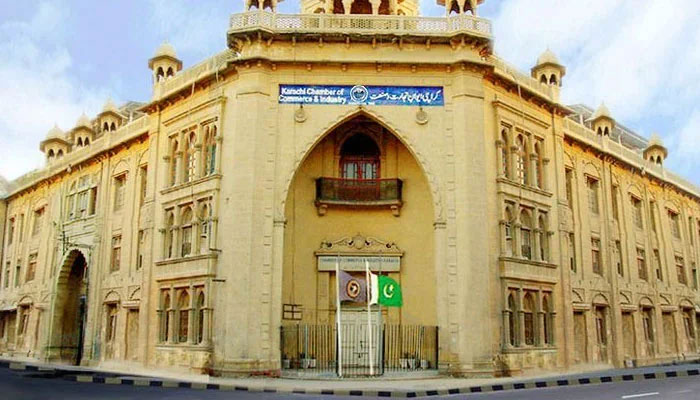KCCI proposes tax rate alignment to plug revenue leaks
KARACHI: Karachi Chamber of Commerce and Industry (KCCI) has proposed to the government to tackle tax evasion and revenue leakage by eliminating disparities in sales tax and withholding tax rates, and rationalizing further taxes.
In its budget proposals for the upcoming fiscal year, the chamber recommended reducing the rate of Further Tax to 1.5 percent for sales to unregistered entities, which will discourage evasion and drastically curtail the fake and flying invoices, resulting in the full recovery of sales tax revenue for the Federal Board of Revenue (FBR).
"All manufacturing units are easily identifiable through their commercial electricity connections. They may be brought into the tax net through registration based on electricity bills," the chamber said. "Leveraging existing data within the FBR to identify and register unregistered persons engaged in taxable activities promotes tax compliance without resorting to punitive measures."
The KCCI also proposed to the government the levy of 1.5 percent Value Added Tax (VAT) on commercial importers in case of sales to unregistered persons. VAT may be waived when the name and CNIC of unregistered persons are provided by the seller, and a .5 percent Further Tax may be levied on commercial importers in case of sales to unregistered persons.
"Establishing consistent tax rates is essential for closing loopholes, curbing tax evasion, and minimizing revenue leakage," it added. "By eliminating variations in rates, incentives for fraudulent activities like fake and flying invoices will be mitigated, thus fortifying the integrity of the tax system and fostering higher compliance rates."
Despite amendments and clarifications, the chamber pointed out that SRO 350(I)/2024 exacerbates compliance challenges, fosters harassment and corruption, and dissuades sales tax registrations.
The KCCI recommended withdrawing these changes and, before introducing any new measures to curb tax evasion through flying invoices, it is crucial that a thorough consultation process is undertaken with stakeholders, including businesses and tax experts.
"This will help in crafting regulations that are effective without being excessively burdensome. Furthermore, we need to abandon this myopic SRO culture and pivot towards a model grounded in robust research and informed policy-making."
The chamber suggested that the government assess all imports of Polyethylene and Polypropylene (HS Codes 3901 and 3902) from Iran based on weekly reports from the S&P Polymer Scan Report (which is in practice by Customs stations at Karachi, Port Qasim, and Dry Ports), treating them as prime grade materials regardless of their declared status and to cease importing Recycled Plastic from Iran, as the country already produces significant volumes of plastic waste and scrap, which are recycled locally.
KCCI also proposed that WHT should be reduced to 1 percent for filers and that it should be adjustable. It should be distributed across the supply chain and 1 percent may be recovered at each stage. For other sectors such as wholesalers and retailers, the chamber recommended that the rate of sales tax should be rationalized.
To address the evident anomaly in tariff rates for similar products, KCCI proposed revising the CD and ACD rates for reactive dyes to align with their status as a basic raw material for the export-oriented textile industry by reducing Customs Duty (CD) from 16 percent to a maximum of 3 percent and by eliminating Additional Customs Duty (ACD) entirely.
-
 Nick Jonas Gets Candid About His Type 1 Diabetes Diagnosis
Nick Jonas Gets Candid About His Type 1 Diabetes Diagnosis -
 King Charles Sees Environmental Documentary As Defining Project Of His Reign
King Charles Sees Environmental Documentary As Defining Project Of His Reign -
 James Van Der Beek Asked Fans To Pay Attention To THIS Symptom Before His Death
James Van Der Beek Asked Fans To Pay Attention To THIS Symptom Before His Death -
 Portugal Joins European Wave Of Social Media Bans For Under-16s
Portugal Joins European Wave Of Social Media Bans For Under-16s -
 Margaret Qualley Recalls Early Days Of Acting Career: 'I Was Scared'
Margaret Qualley Recalls Early Days Of Acting Career: 'I Was Scared' -
 Sir Jackie Stewart’s Son Advocates For Dementia Patients
Sir Jackie Stewart’s Son Advocates For Dementia Patients -
 Google Docs Rolls Out Gemini Powered Audio Summaries
Google Docs Rolls Out Gemini Powered Audio Summaries -
 Breaking: 2 Dead Several Injured In South Carolina State University Shooting
Breaking: 2 Dead Several Injured In South Carolina State University Shooting -
 China Debuts World’s First AI-powered Earth Observation Satellite For Smart Cities
China Debuts World’s First AI-powered Earth Observation Satellite For Smart Cities -
 Royal Family Desperate To Push Andrew As Far Away As Possible: Expert
Royal Family Desperate To Push Andrew As Far Away As Possible: Expert -
 Cruz Beckham Releases New Romantic Track 'For Your Love'
Cruz Beckham Releases New Romantic Track 'For Your Love' -
 5 Celebrities You Didn't Know Have Experienced Depression
5 Celebrities You Didn't Know Have Experienced Depression -
 Trump Considers Scaling Back Trade Levies On Steel, Aluminium In Response To Rising Costs
Trump Considers Scaling Back Trade Levies On Steel, Aluminium In Response To Rising Costs -
 Claude AI Shutdown Simulation Sparks Fresh AI Safety Concerns
Claude AI Shutdown Simulation Sparks Fresh AI Safety Concerns -
 King Charles Vows Not To Let Andrew Scandal Overshadow His Special Project
King Charles Vows Not To Let Andrew Scandal Overshadow His Special Project -
 Spotify Says Its Best Engineers No Longer Write Code As AI Takes Over
Spotify Says Its Best Engineers No Longer Write Code As AI Takes Over




